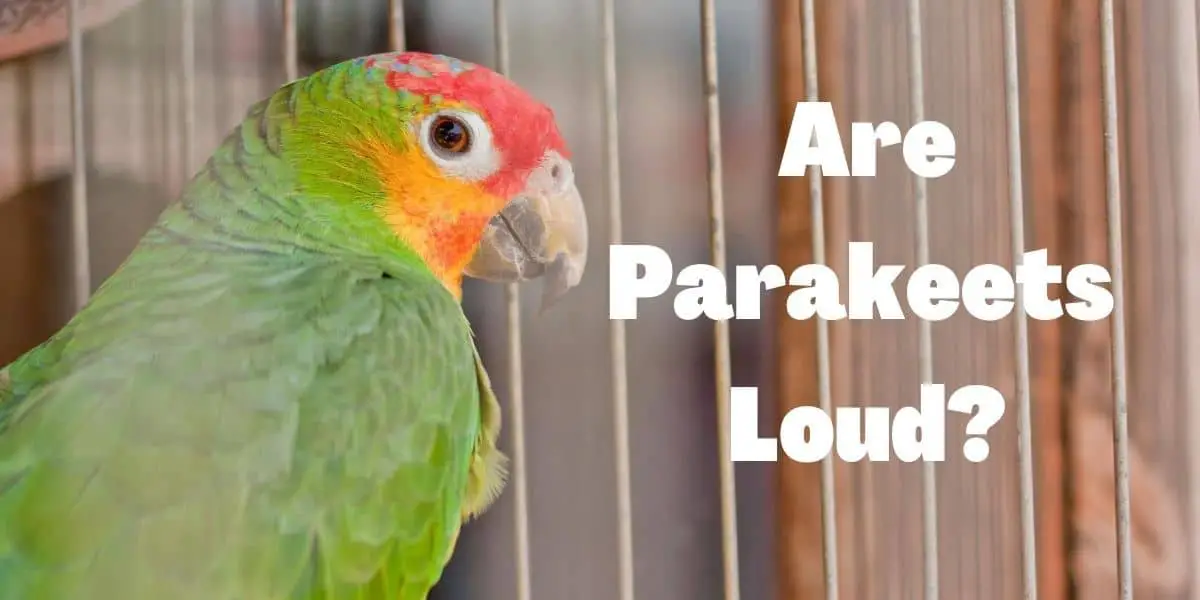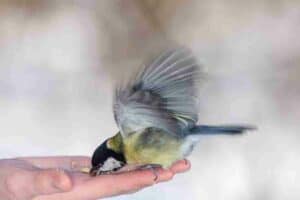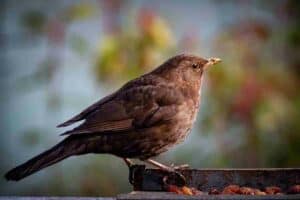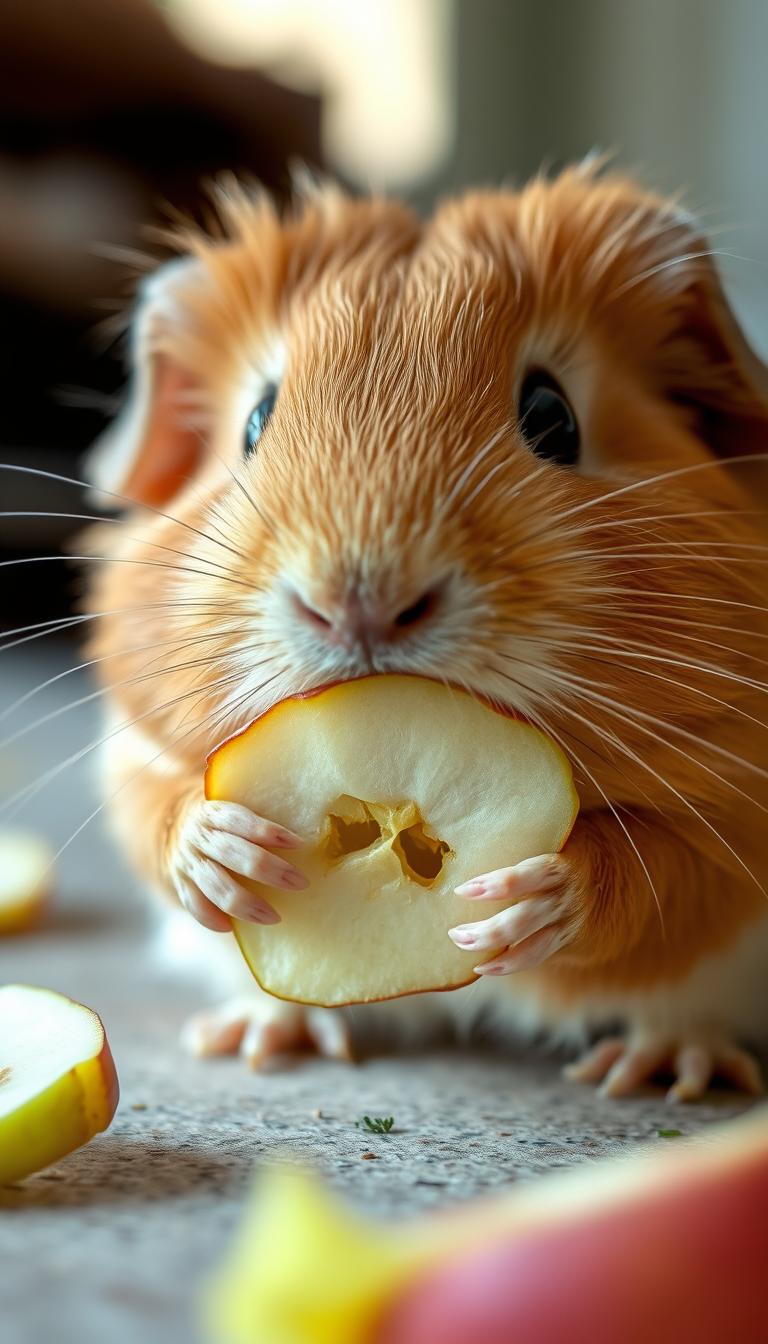Having a pet bird can be one of the most enjoyable experiences in anybody’s life, even more so if it’s a pet parakeet.
No wonder parakeets are the most sought-after parrot species in the world today. They are stunning to look at, social, friendly, and innately curious.
Like most parrots, parakeets are loud. In fact, they’re one of the most vocal kinds in the bird family. These brightly colored, slender birds are maestros of sound. They’re capable of producing so many different types of sound that you’d be amazed to know.
That being said, parakeets don’t squawk and screech all the time. They will produce a loud screaming noise about once a day for several minutes or half an hour at most.
At night, parakeets will quietly fall asleep and refrain from making any noise since they are diurnal creatures.
Not many know, but parakeets are extremely smart birds with highly developed cognitive capabilities.
Parakeets Can Decipher Grammar as Well as a 7-month-old toddler
Yes, you read that right!
Are parakeets loud? Yes, but they’re definitely smarter!
A 2016 study by the University of Leiden’s scientists established that parakeets, commonly known as budgerigars or budgies in the US, can detect abstract patterns in language. Parakeets’ capabilities are only about that of a 7-month-old baby, but hey, that’s still impressive for a bird, right?
Parakeets aren’t just avid listeners. These little birdies are capable of producing so many different kinds of sound and expressing themselves.
By just listening to the sound, you will be able to tell whether they’re happy, sad, and much more. Now let’s decode parakeet’s sounds and their meaning, shall we?
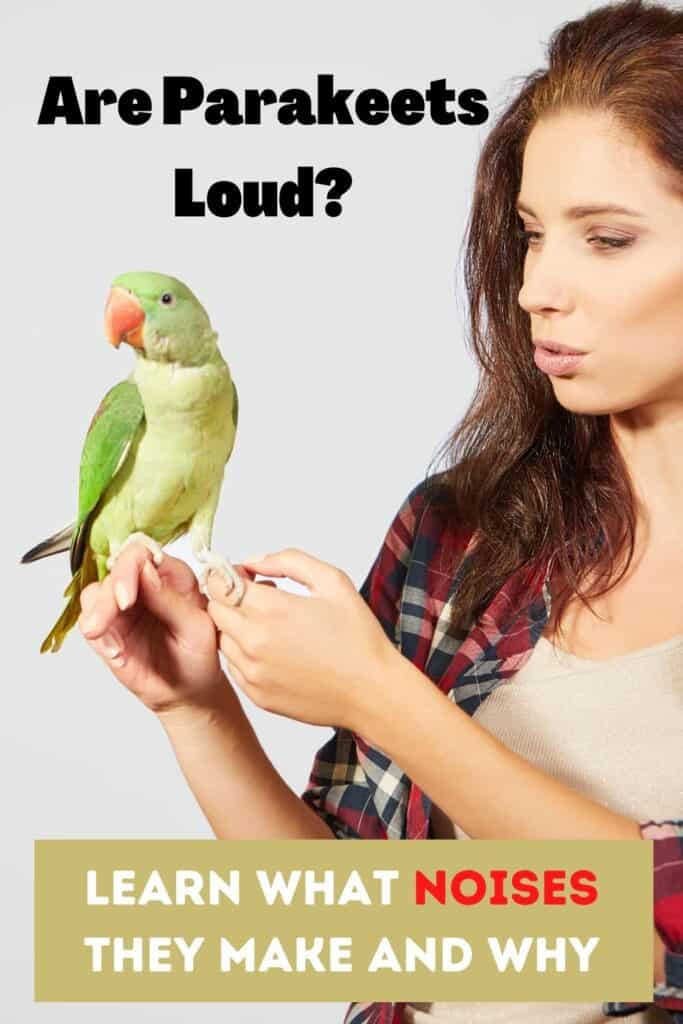
Parakeet’s Sounds and Their Meanings
Let’s see if we can understand the different noises birds make which will help us care for their need better. Sometimes the sounds they make at night mean different things form the sound throughout the day.
Squawking
If you own a pet parakeet, we don’t have to tell you how agonizing it is to the ears when your birdie starts squawking.
Questions like are parakeets loud are often asked after the owner has experienced the first bouts of squawking.
Once your parakeet starts squawking, the noise should be the last thing you need to be worried about.
Squawking is your bird’s way of telling you that’s something’s seriously wrong. There could be differing reasons behind this rather unpleasing noise. Some of them are:
- A predator (real or imaginary) is nearing your parakeet
- The hormonal level surges during the mating season
- Your parakeet is physically injured or is in pain
- Their earlier call for food or assistance went unnoticed
Once you make sure that there’s no trouble in sight, you can gently coax your parakeet into stopping its squawking.
For this, gently start talking to the bird in a soothing voice. You can also partially cover the cage with a pet blanket to create a secure environment.
Hissing
Hissing — one more unpleasant sound on the list! Sometimes, your parakeet will produce a hissing or chiding sound that almost sounds like a tsssssk! Now that’s quite unusual for a bird as loud as a parakeet, isn’t it?
Generally, parakeets produce such sounds if their personal space is being invaded during nesting or in an overcrowded environment.
Actually, it’s more like a warning to whoever or whatever to back off! In a big aviary, hissing is quite normal, but if your parakeet has been producing this sound a lot lately, make sure you’re giving it enough space.
Other pet members in the house, like dogs, cats, or even fellow birds, usually bear the brunt of hissing!
Singing
Let’s make it clear once and for all! For all their vocal abilities, parakeets aren’t great singers. Don’t forget that they are parrots, not songbirds.
However, they can produce an impressive range of whistles, trills, chatters, chirrups, and other sounds that are pleasing to the ear.
Your parakeet tends to pull all these tunes in a medley to create a rather ‘tuneless’ but a lovely song.
Parakeets usually sing to express happiness and enjoyment. And if you have a pair of parakeets, most of the time, they’ll sing together.
Chattering
If your parakeet starts chattering, know that it’s going to continue for some time. They’ll even sit down and hunch their shoulders slightly to start the chatter session, characterized by a mumbled conversation with oneself.
Usually, they’ll use the words you’ve taught them or the ones they’ve picked up. Don’t worry; your parakeet isn’t lonely or crazy — it’s just an innate habit.
A male parakeet will often chatter during the mating season to court and woo a female bird. In the absence of a mating partner, he’ll resort to chattering with his own reflection!
Chirping
Chirping is the most common and popular sound your parakeet will make. Well, chirping can take up different tunes, from mellow song-like melody to high-pitched vocals.
But mostly, it’s just a single, repetitive, and sharp tweet that sounds like chirrup!
While parakeets often chirp to express cheeriness and contentment, it can also be a call for refilling its food or water dish.
Note: If your parakeet chirps as soon as you enter the room every single time, it could be a telltale sign that it’s feeling lonesome and wants some attention.
Don’t forget to spend a few minutes, talk, feed, and show a little attention.
Well, don’t jump to a conclusion fast — parakeets often chirp to greet you. Only take heed if you notice an unusual pattern.
Unhappy Tweets
The same chirrup sound we mentioned above can sometimes be an angry tweet! If your parakeet’s chirps loudly for several minutes, know that it’s actually a displeased tweet.
Once again, the reason behind it can vary from lack of food and/or water to a dislodged perch or swing or a contact call to a fellow parakeet that does not pay attention.
If the tweets don’t stop and continue to grow louder, it could also mean they’re feeling threatened, discomfort, or pain. Make sure to check that everything’s alright.
Beak Grinding
Parakeets often make a happy noise that sounds like they’re chewing something or gritting. Usually, they’ll sit on a perch and make a crackling, grinding sound, which means that they’re happy!
Yes, albeit unusual, but a joyful noise — something similar to a cat’s purring. Parakeets make this noise by rubbing the two halves of the beak together.
Other Sounds
Parakeets are great imitators. Don’t be surprised if someday you hear them mimicking the phone ring or a wailing baby.
If they pick up sound from the environment, it’s a good sign; showing that your parakeet keeps itself entertained and happy.
However, if one particular sound you think is too unusual, watch your parakeet’s body language for symptoms of stress or anxiety.
By now, you probably know or have guessed that parakeets are amazing talkers. These little creatures can learn hundreds of words, exceeding many birds larger than them.
Generally, female parakeets are less chatty and sociable than males. So, it can take some time to teach them to talk, but with consistent practice and effort, it’s easily attainable.
Cage Size
All birds kept in captivity show have a safe and roomy cage to sleep in at night. You should also allow your bird to fly freely in a safe and closed room to allow them to exercise and have fun!
If their cage is too small they will express their opinions via sounds and aggressive, destructive ways.
A suitable cage is the Prevue Parakeet and Parrot wrought-iron cage. One of the best parakeet cages in the world.
Here are a few things to know before teaching your parakeet to talk:
- Your pet parakeet should be at least 3-4 months old
- Teach in your native language or the language used most often and naturally at home
- Start by teaching simple terms like its own name and name of other parakeets
- Never punish your parakeet if it doesn’t show interest or makes errors
- Always reward your parakeet with a little treat after a good training session
- If there are multiple parakeets, start by training one, and it’ll set an example for others to follow
- Talk enthusiastically in an animated voice so that it ignites your parakeet’s interest
- Once your parakeet masters a few words, slowly move to phrases—one phrase at a time
- After your parakeet learns a few phrases, you can try teaching it the names of objects by holding it and pointing towards it
Final Thoughts
The answer to are parakeets loud is ‘yes, definitely’! Like all birds, they will make noises, but it’s not something that’s going to be unbearable.
Parakeets are more deliberate than you’d think with the sounds they produce, and eventually, you will learn everything you need to know about parakeet’s sounds and meanings — whether they’re ill, just want attention, or are merely having a good time.

